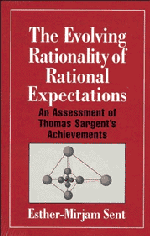2 - Accommodating Randomness
Published online by Cambridge University Press: 18 December 2009
Summary
Fate, Time, Occasion, Chance and Change? To these
All things are subject but eternal Love.
Percy Bysshe Shelley, Prometheus UnboundIn this chapter, I focus on the story Sargent is likely to have told when he was trying to use rational expectations economics in the late 1960s to early 1970s. An argument is made for his interest in achieving what he would regard as conceptual integrity of the determinism in neoclassical economic theory and the randomness in econometrics. This involves providing a narrative of how he came to the idea of rational expectations and what he had to relinquish to be able to put his initial interpretation of the concept to use. However, before focusing on Sargent, it is important to consider the context within which he developed his ideas. The case study focuses on the tensions among probabilism, determinism, and randomness in philosophy, neoclassical economics and econometrics, and Sargent's work, comparing and contrasting these tensions. The intent is to braid the two narratives of, on the one hand, free and forced moves and, on the other hand, probabilism, determinism, and randomness. Section 2.1 gives a brief analysis of the general relationships among probabilism, determinism, and randomness; 2.2 discusses its treatment in neoclassical economics and econometrics. Section 2.3 looks at the free and forced moves made by Sargent in an effort to dissolve the tensions among probabilism, determinism, and randomness.
- Type
- Chapter
- Information
- The Evolving Rationality of Rational ExpectationsAn Assessment of Thomas Sargent's Achievements, pp. 23 - 47Publisher: Cambridge University PressPrint publication year: 1998

